Hail and Well Met Everyone!
You might have been wondering where in the world I had vanished…. well I won’t lie, it’s been a nice little three week break over the holidays and beginning of the new year. I’m finally back on a regular schedule of writing, planning, and getting new topics lined out for the website. This is a rather long article of lore….So let’s not dilly-dally any longer and get to it shall we.
When we left off last time we had just seen the Battle of Flames and a small band of men called the Edain who were able to withstand the corruption of Morgoth and began feeding the elves information about the dark lords every move.
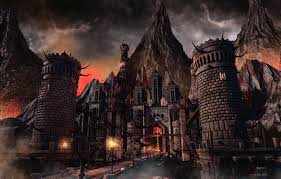 Siege of Angband
Siege of Angband
The siege of Angband was broken 455 years after Fingolfin came to Middle-earth, when Morgoth started the War of Sudden Flame or it’s Sindarin name “Dagor Ballogach”. One cold winter night, when the Elves were off guard, Morgoth brought terrible rivers of fire and lava from Thangorodrim and poisonous fumes from the Iron Mountains. The Elves were completely unprepared for such an assault, and many Noldor perished on the Ard-galen, as the fires consumed it and transformed it into a lifeless wasteland, forever after known as the Anfauglith.
With the exception of Maedhros and his fortress upon the Hill of Himring, the sons of Feanor and Finarfin were overthrown and defeated. Fingolfin and Fingon only just barely managed to defend Hithlum from Morgoth’s onslaught, as the mountains surrounding it provided an effective barrier against Morgoth’s fires. The Elves were completely driven from the forests of Dorthonion, and many of the Grey elves forsook the war altogether and went to Doriath. When news came to Fingolfin of the defeat of the Elven forces, a great despair came upon him. Believing the Noldor to have been defeated beyond any hope of recovery, he rode forth from Hithlum to the gates of Angband in a wrath so potent that he was said to have resembled Orome himself. When he arrived at Morgoth’s fortress he challenged the Dark Lord to come forth and fight. Though Morgoth did not wish to, Fingolfin’s challenge was heard by all in Angband, and was given in such an insulting manner that to ignore it would have been to lose face before his captains.
Morgoth came forth dressed in his black armour from Angband to confront Fingolfin. Wielding the terrible hammer Grond in which he attempted to kill the Elven-king repeatedly, but succeeded only in carving many fiery pits in the ground from his missed strikes. Fingolfin managed to avoid Morgoth’s blows, and wounded the Dark Lord seven times. But at last, Fingolfin grew weary, and Morgoth brought him to his knees. Fingolfin arose each time to continue the fight, but eventually he fell backwards into one of the many pits formed by Morgoth’s missed attacks. Morgoth took his foot upon Fingolfin’s neck and killed him, but not before Fingolfin, cut Morgoth’s foot with his sword. Morgoth enraged broke the Elven-king’s body, but Thorondor, the King of the Eagles, swooped down on Morgoth, marring his face with his talons, and rescued the body of the Elf-king.
Fingolfin’s last stroke gave Morgoth a permanent limp, and the pain of his seven wounds could not be healed, nor were the scars ever erased.
After the battle, Morgoth sent out spies to watch over the Edain men, but when the Edain refused his false offers of peace he summoned the Easterlings over the Blue Mountains. However, he soon realized that he had underestimated the resolve and valor of his foes, for the Elves and Edain, recovering from the initial shock of Morgoth’s onslaught, had begun to make small gains against his outlying forces. He therefore checked his advances, and withdrew the main groups of Orcs to Angband. Though Morgoth’s victory had been great, his own losses had been as numerous as the losses that had been accrued by the Elves. Seven years passed before Morgoth renewed his offensive abilities. He assailed Hithlum with great strength but just as he was on the verge of victory, Cirdan and a large army under his command came at the last moment and helped Fingon to turn the Orcs back.
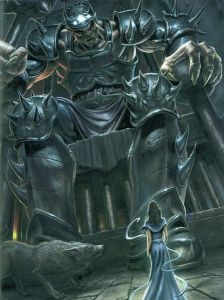 The Quest of the Silmaril
The Quest of the Silmaril
Some time later, the Elven-maiden Luthien and her human lover Beren, seeking to recover a Silmaril, came disguised to Morgoth’s court. Morgoth was able to see through her disguise, but she was undaunted by his eyes, and offered to sing for him. As she sang, Morgoth conceived a lust and an evil more abominable than any he had yet committed, and allowed her to continue singing. This was his downfall; suddenly shadow hid her, and she sang a terrible song of power that cast a spell of sleep.
All Morgoth’s court was cast down in a deep sleep by her song, but the Silmarils burned, and became so heavy that the head of Morgoth sagged upon his chest. He fell from his throne, the Iron Crown rolled away with a clang, and Beren cut a Silmaril from the neck of Morgoth. However, rather than leaving immediately with his prize, he tried to take another of the Silmarils. As he attempted to pry the second jewel loose, his knife snapped. One shard struck Morgoth’s face, and he began to awaken. Beren and Luthien fled, but the dreaded werewolf Carcharoth bit off Beren’s hand. Then Morgoth awoke, and in a rage he and his court roared up in pursuit, only to see Thorondor carrying off the raiders. Morgoth’s rage at the loss of the Silmaril caused the Iron Mountains to begin erupting, but Morgoth wasn’t able to recover the Silmaril.
Soon after, Morgoth became aware that Maedhros was making a great army against him, and driving his orcs off the northern heights. He took council against them and prepared his forces for a major confrontation. When the Elves made it to Angband, the Battle of Nirnaeth Arnoediad, began. Ultimately, the battle was a complete and decisive victory for Morgoth. The power of the Elves and the Edain were broken against Morgoth. The Noldor from the north of Beleriand, and all their great kingdoms besides Gondolin were destroyed. The Edain who did not flee were enslaved by Easterlings, and Hurin was taken captive.
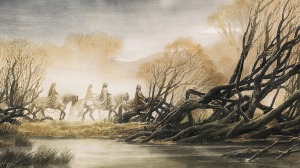 The Cursing of Hurin
The Cursing of Hurin
Morgoth was also well known for the imprisonment of Hurin of the House of Hador during the Nirnaeth Arnoediad. In the last hours of the battle Hurin and his kin defended Turgon, for he was the last heir to the throne of Gondolin and of Fingolfin after his brother, Fingon, died in battle. Turgon narrowly escaped the clutches of the orcs due to the valor of Hurin and Huor and their men.
Unfortunately, all but Hurin fell after the onslaught of Morgoth’s forces. After slaying untold numbers of Trolls and Orcs, Hurin was captured by Gothmog and sent to Angband. Morgoth knew that Hurin had been to Gondolin, and knew of its location. Morgoth sought to extract the information from him but, despite inflicting terrible torment upon his captive, was unsuccessful.
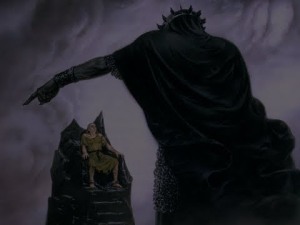 Morgoth sentences Hurin
Morgoth sentences Hurin
From a distance Morgoth put the son and daughter of Hurin, Turin and Nienor, under a species of diabolic oppression: his thought followed them and gave them bad luck, though they were not possessed. By this means he drove them at last to madness and despair; though there is doubt as to whether in the extremity of his malice he cheated himself, as their madness saved them from damnation.
Morgoth brought a great curse upon the people – “Behold! The Shadow of my thought shall lie upon them wherever they go, and my hate shall pursue them to the ends of the world.” But all whom you love my thought shall weigh as a cloud of Doom, and it shall bring them down into darkness and despair. Wherever they go, evil shall arise. Wherever they speak, their words shall bring ill counsel. Whatsoever they do shall turn against them. They shall die without hope, cursing both life and death.
And so Hurin stayed and was chained atop Thangorodrim, forever watching his homelands fall under the shadow of Morgoth until he released him. Turin, who was valiant and powerful, nearly escaped the curse, as feared by Morgoth, but could not leave it. He and his sister perished and the curse of Morgoth on the Children of Hurin was fulfilled.
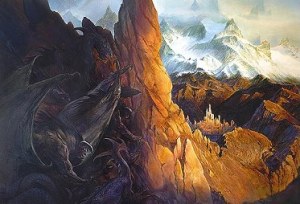 The Fall of Gondolin
The Fall of Gondolin
Though he had been unable to force Hurin to reveal the location of the last great Elven kingdom, Morgoth eventually captured Maeglin, son of Turgon, the King of Gondolin. Threatened with unimaginable torment, Maeglin offered the secrets of Gondolin’s defenses in exchange for his own wellbeing. Additionally, he made a promise to kill Tuor personally, and was given permission by Morgoth to take Idril for himself. With the promise of having Idril, Maeglin became Morgoth’s servant and sent him back to Gondolin to aid the invasion from within when the time came.
Soon after, Morgoth assaulted Gondolin, the last great realm of the Noldor, and with a superior force and Maeglin’s treacherous information, the city was destroyed without hope and quickly fell.
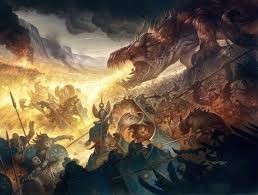 Final defeat and War of Wrath
Final defeat and War of Wrath
However, Morgoth’s triumph was relatively short lived. Due to the plea actions of Earendil, the Valar were persuaded once again to take up arms against Morgoth’s tyranny. Morgoth himself did not expect that the Valar would ever help the Noldor after the terrible sins they had committed, and did not foresee the assault from Aman. But the Valar took pity on the Noldor, and a great battle began between Morgoth and the Host of Valinor. Morgoth emptied all of Angband, and his devices and engines and armies of slaves were so various and powerful the fighting spilled across all Beleriand.
In the end, Morgoth’s forces were completely defeated. The Balrogs were destroyed, except a few that fled and hid themselves in the caverns of the earth, and the Orcs were slaughtered. Morgoth hid in fear, and dared not come forth himself, but he had one last weapon at his command; the monstrous Winged Dragons. From out of the pits of Angband he called them to battle, with great power and fire, they drove back the Valar. But then Earendil came with Vingilot, accompanied by Thorondor and all the great birds, and killed Ancalagon The Black, whose great body fell upon the towers of Thangorodrim destroying them. Morgoth, utterly defeated stood and watched. He fled into the deepest of his mines, but his feet were cut from under him, and he was cast down upon his face. He was bound with the chain Angainor, his Iron Crown was beaten into a collar for his neck, and he was thrust through the Door of Night into the Timeless.
This concludes our lore series on the dark lord, but next week we kick off a brand new series (The Kings of Gondor) so until next weeks episode, I’m your host Iogro Merrybelly and I bid you a fine farewell!

Maeglin was actually the son of Eöl the Dark Elf and Aredhel daughter of Fingolfin of whom Eöl had treacherously taken for wife. Turgon and Aredhel were brother and sister. Turgon was also the father of Idril whom Maeglin lusted after. But such a union was not permitted in the Elven culture being they were too close of relations (first cousins). It was after Morgoth promised Maeglin to give him Idril and Gondolin that Maeglin would betray his own race and commit the worst act of betrayal in all Elvish history since he was the only Elf known to ever willingly serve Morgoth for his own personal and selfish gain.
I was remembering a slightly different version of he fall of Gondolin. I wonder if there are a couple of versions because of christopher editing (and tolkein changing his mind etc.) What I remember was Morgoth releasing Hurin, and Hurin being lost and unable to find Gondolin. Dying in his starvation, he accidentally reveals its location with a cry of desperation. Spies of Sauron (sent by Morgoth) overhear this and thus Gondolin is revealed.
I think the version involving Maeglin in a later version whether a Christopher editing or not. Tolkien had many versions of his world floating around primarily I think to add to the mythos and authenticity of Middle-Earth history. Even in our history there are different versions of how things happened – especially of times long ago. We may never know which version is the true telling of how JRR Tolkien actually saw it, but this is how he apparently wanted it and I personally like the one I am referring to the best! 🙂
Minor quibble: There was no, “Death of Morgoth.”
He was banished to the void, and will return for Dagor Dagorath, the Battle of Battles, the Day of Doom, when Turin shall return and finally defeat him.
@davidt Indeed there was no death of Morgoth as he was banished, and there were some of Tolkiens un-finished tales that mentioned the prophecy that Morgoth would return. I do like the conversations, and I named the article the Death of Morgoth for a conversation piece. Hope you all enjoyed the read.
Can’t wait for an in depth biography Iogro, keep it up
Twas minor. Lots of great info you included in the write-up 🙂